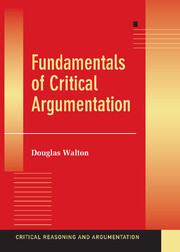THREE - ARGUMENTATION SCHEMES
Published online by Cambridge University Press: 05 June 2012
Summary
Several distinct forms of argument are identified in chapter 3 that are not deductive or inductive in nature. These arguments are inherently presumptive and defeasible, and thus they are different in nature from deductive and inductive arguments. Each of the forms of argument described in this chapter is used as a presumptive argument in a dialogue that carries a weight of plausibility. If the respondent accepts the premises, then that gives him a good reason also to accept the conclusion. But it does not mean that the respondent should accept the conclusion uncritically. Matching each form of argument is a set of appropriate critical questions to ask. In a given case, there may be a balance of considerations to take into account. There may be some arguments in favor of the conclusion and some against it. These forms of inference are called argumentation schemes, and they represent many common types of argumentation that are familiar in everyday conversations. They need to be evaluated in a context of dialogue. They are used to shift a burden of proof to one side or the other in a dialogue and need to be evaluated differently at different stages of a dialogue. Only a few of the most important and familiar of these common types of argument are described in chapter 3. Others, such as argument from consequences, are described in chapter 4.
- Type
- Chapter
- Information
- Fundamentals of Critical Argumentation , pp. 84 - 137Publisher: Cambridge University PressPrint publication year: 2005



